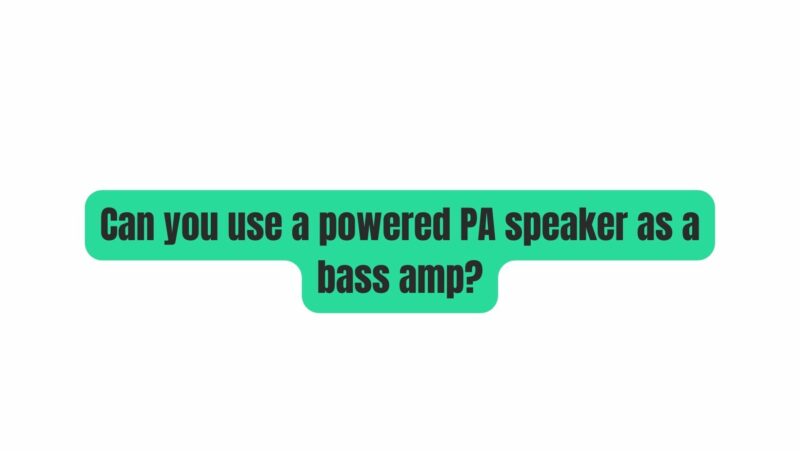Musicians and bassists often seek versatile and cost-effective solutions for amplifying their instruments, and one question that frequently arises is whether you can use a powered PA speaker as a bass amp. In this comprehensive guide, we will explore the feasibility, advantages, and considerations of using a powered PA speaker as a bass amplifier.
Understanding Powered PA Speakers and Bass Amps
Before delving into the specifics, it’s crucial to understand the fundamental differences between powered PA speakers and bass amplifiers:
- Powered PA Speaker: A powered PA (Public Address) speaker is an all-in-one speaker system that includes a built-in amplifier. These speakers are designed for a wide range of audio applications, from live music performances and public speaking to DJ setups and more. They often feature full-range sound reproduction capabilities.
- Bass Amplifier (Bass Amp): A bass amplifier, on the other hand, is specifically designed to amplify the sound of a bass guitar. It includes preamp and power amp sections tailored for bass frequencies and often has tone-shaping controls such as EQ (equalization) for shaping the bass tone.
Using a Powered PA Speaker as a Bass Amp
While powered PA speakers are not designed exclusively for bass amplification, they can be used as makeshift bass amps in certain situations. Here are the steps and considerations for using a powered PA speaker as a bass amp:
- Check the Input: Most powered PA speakers have line-level inputs or combo jacks that can accept both XLR (microphone) and 1/4-inch instrument cables. Ensure that the PA speaker you intend to use has an appropriate input for your bass guitar.
- Set the Input Gain: If your powered PA speaker has gain or volume controls for the input channel, start with the gain at a low level and gradually increase it while playing your bass guitar. Adjust the gain to achieve the desired volume without clipping or distortion.
- EQ and Tone Shaping: Some powered PA speakers offer EQ controls to shape the sound. Experiment with these controls to find the bass tone you prefer. Keep in mind that bass amps typically have more specialized EQ settings tailored for bass frequencies.
- Volume and Output: Powered PA speakers often have plenty of power to produce high volumes. Adjust the volume to your needs and the venue’s size, and ensure it doesn’t overwhelm the audience or your fellow musicians.
Advantages of Using a Powered PA Speaker for Bass
Using a powered PA speaker as a bass amp offers several advantages:
- Versatility: A powered PA speaker can serve multiple purposes, making it a versatile piece of equipment for various audio applications beyond bass amplification.
- Portability: Powered PA speakers are often designed with portability in mind, making them easy to transport to gigs, rehearsals, or different locations.
- Cost-Effective: If you already own a powered PA speaker, using it as a bass amp eliminates the need to purchase a separate bass amplifier, saving you money.
Considerations and Limitations
While using a powered PA speaker as a bass amp can be practical, there are some considerations and limitations to keep in mind:
- Sound Quality: Bass amplifiers are specifically designed for bass frequencies and often provide better sound quality and tone shaping options for bassists. PA speakers may not offer the same level of bass clarity and warmth.
- Volume and Power Handling: Ensure that the powered PA speaker you use can handle the power output of your bass guitar without distortion or damage. Bass guitars can produce substantial low-end frequencies that may challenge the speaker’s capabilities.
- Tone Shaping: Bass amplifiers typically include dedicated EQ controls for shaping the bass tone. PA speakers may have a more general EQ, which can limit your ability to fine-tune your bass sound.
- Feedback and Monitoring: PA speakers are not designed with features like feedback suppression or headphone outputs that are commonly found on bass amplifiers.
Conclusion
Using a powered PA speaker as a bass amp is possible and can be a practical solution in certain situations, especially for bassists looking for a versatile and cost-effective option. However, it’s essential to consider the limitations in terms of sound quality, tone shaping, and power handling.
If you’re primarily focused on bass playing and are seeking the best possible tone and control over your bass sound, investing in a dedicated bass amplifier is recommended. Bass amplifiers are designed to provide the optimal platform for bassists to shape their tone and deliver the low-end frequencies that define the bass guitar’s character.


